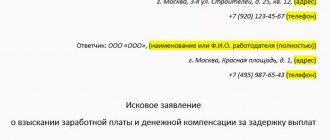The civil duty of any person is to bear responsibility for a crime or offense committed. The offense for which a person is convicted must be very serious. Even serving a sentence does not allow a criminal record to be removed or expunged. There is a certain period (1-10 years) during which a person is still considered potentially dangerous to society and must be under the supervision of the state. When committing a new illegal act, the punishment is more severe.
Having a criminal record is a serious problem not only for the person himself, but also for his family and friends. There are a number of restrictions according to which a citizen or his relatives with a criminal record cannot hold certain positions and work in certain departments. Based on this, a completely logical question arises: can a person be refused employment if relatives have a criminal record and when such actions are permissible by law. Detailed information on the topic will be presented in the article.
Types of criminal records that may be established by law
In Art. 86 of the Criminal Code of the Russian Federation states that a criminal record is established only by a court verdict and lasts until it is completely expunged or removed. Today the following types of criminal records are distinguished:
- Current, which a newly released person may have when the required period for repaying it has not yet passed.
- Conditional, applies to people who have been given a suspended sentence. In fact, it is no different from the previous one. Early withdrawal through the court is possible if the offender proves that he deserves it.
- Extinguished, it occurs after a person has served his sentence and has not committed any criminal acts for a certain period of time.
- Withdrawn - removed by the judiciary or another body, as a result of the good behavior of the convicted person, or for other reasons (amnesty).
Information about a person’s criminal record is posted and stored in the GIAC of the Russian Federation. Data can be removed from there only by going to court with evidence that exonerates the person. For example, a citizen was convicted illegally or by mistake. As a result, his criminal record is removed and the data is removed from the database.
How can you get a job with a criminal record?
A citizen released from prison must first familiarize himself with labor legislation, which sets restrictions on hiring persons with a criminal record.
You should not even try to get a job in a public or private company for a financially responsible position.
Start trying with small private firms with low salaries; a larger employer will certainly be interested in a significant break in your work history.
If attempts to find a job with an employer are unsuccessful, you can try to become an individual entrepreneur. True, there are some limitations here too.
For example, difficulties may arise in obtaining permits if a previously convicted person decides to engage in:
- security or private detective activities;
- banking, lending;
- educational activities.
Does not work? Then contact the regional employment service, register or use information services.
If at the time of your application there is no suitable vacancy, then the employees of the employment center can refer you to training courses, upon completion of which you will have a new specialty and it will become much easier to find a job.
In addition, in recent years, special centers for the adaptation of former prisoners have begun to open in many cities. Here they do everything possible so that a person with a criminal record can get a job.
Where can such citizens not work?
Persons with a criminal record cannot work in various departments, for example, in the economic sphere and in the field of education, upbringing, child development, bailiffs, prosecutors, employees of the Ministry of Emergency Situations, in aviation and transport. Restrictions are established in such a way that a citizen cannot re-commit a crime and thereby cause harm to society.
If a restriction in the form of a criminal record was lifted from a person due to rehabilitating circumstances, then they cannot refuse to hire him. When applying for employment, the basis on which the citizen received a criminal record also plays a role.
Where are they not hired because of a criminal record?
Having a criminal record when applying for a job is important in the case of employment in educational, educational, medical, social, and cultural institutions.
The full list of types of activities for which a criminal record imposes restrictions on hiring is outlined in Art. 331 and 351 of the Labor Code of the Russian Federation.
When trying to find a job in an institution from this list, the employer will definitely require a certificate of no criminal record. You can obtain this certificate from the Ministry of Internal Affairs at your place of registration.
Thus, having a criminal record, you cannot become:
- an employee of an educational institution;
- employee of the prosecutor's office, the bar and the judiciary;
- customs officer and FSB employee;
- military personnel and auditor;
- employee of government agencies;
- deputy and president;
- air force employees.
So, a criminal record, even an old one, imposes restrictions on the choice of profession.
Features of getting a job if there are relatives with criminal records
This point is especially interesting if we are talking about joining the army or some government department. A common problem that such applicants may encounter is obtaining access to state secrets. The employer must be confident in the complete “purity before the law” not only of the citizen himself, but also of his entire family.
When filling out an application form for employment, it is necessary to fill out all the fields in as much detail as possible, including the item on the criminal record of relatives, since entering false data can lead to refusal. Only close relatives will be checked - spouses, parents, children, brothers and sisters, grandparents. Information is even being studied about adopted children and parents.
It is extremely important to provide only accurate information when submitting an application and filling out the application form. During the verification, the biography of each close relative will be studied. If an applicant for a position indicates in advance that a loved one had a criminal record, but has already been expunged, this will give him a chance to get a job. In such circumstances, the decision is made on an individual basis, therefore, the more honest the applicant behaves, the more positive the result will be for him. Such rules apply to structures such as the FSB and other law enforcement agencies, where they will have to work with state secrets.
Which relatives are being checked?
The results of testing relatives plays an important role. A candidate may meet all the requirements, but will be rejected only because one of his relatives “let us down.”
The whole family will not be thoroughly checked. The inspection commission is only interested in close relatives . Therefore, the candidate must ensure that his family meets the requirements before joining the FSB.
Which relatives are considered close when checking by the FSB:
- Parents;
- Children, even adopted children;
- Spouse;
- Siblings;
- Dear aunts and uncles.
Can they refuse to apply for a job if there is a relative with a criminal record?
In addition to the listed grounds, the employer has no other reasons for refusing employment. Managers of commercial enterprises are not very interested in this issue. Usually, the criminal record of relatives is checked only when applying for a job in a large corporation.
There is one more significant nuance. The presence of an administrative offense is not a reason for denial of employment, however, neither is the criminal record of a distant relative. When a potential employer refuses an applicant for precisely these reasons, it means you can go to court and defend your rights there.
What the law says
I will begin by analyzing the issue by saying that the current legislation does not have such a basis for refusing employment to a promising candidate as “conviction of a close relative”; there is simply no such basis in any federal law; it is absent.
In the course of analyzing this issue, I examined the following federal laws to determine whether there is such a basis for refusal of employment as “criminal record of a close relative”:
1) Federal Law “On Service in the Internal Affairs Bodies of the Russian Federation” dated November 30, 2011 No. 342-FZ; 2) federal law “On the Investigative Committee of the Russian Federation” dated December 28, 2010 No. 403-FZ; 3) federal law “On the Prosecutor’s Office of the Russian Federation” dated January 17, 1992 No. 2202-1; 4) Federal Law No. 328-FZ dated October 1, 2019 (as amended on December 22, 2020) “On service in the compulsory enforcement agencies of the Russian Federation; 5) Federal Law No. 40-FZ dated 04/03/1995 (as amended on 11/09/2020) “On the Federal Security Service.” 6) regulatory legal acts dedicated to the Federal Security Service (FSO).
Here is an extensive list of legal acts, but in none of them did I find such a basis for refusal of employment as “criminal record of a close relative.”
Having analyzed the basic requirements for candidates for employment in law enforcement agencies, we can conclude that the criminal record of a close relative is not a basis for refusing to employ a candidate.
Attention! In accordance with paragraph No. 41 of the “Instructions on the procedure for selecting citizens of the Russian Federation and accepting documents for admission to service in the internal affairs bodies of the Russian Federation, approved by order of the Ministry of Internal Affairs of Russia dated July 18, 2014 No. 595”, in case of receiving, based on the results of a verification of the accuracy of information reported by the candidate information about the criminal record of his close relatives, the decision to hire him for service is made by the relevant manager individually, taking into account the severity of the crime committed, the degree of relationship, relationships and frequency of communication, the financial or other dependence of the candidate, the nature of the upcoming service in the internal affairs bodies.
Thus, the head of a department or division decides for himself and takes responsibility for such a decision, whether to hire an intelligent employee into his department or not, but this happened before.
Attention!
In 2021, the Supreme Court of the Russian Federation declared invalid paragraph 41 of the Instruction on the procedure for selecting citizens of the Russian Federation and accepting documents for admission to service in the internal affairs bodies of the Russian Federation (Appendix No. 1), approved by order of the Ministry of Internal Affairs of the Russian Federation dated July 18, 2014 No. 595, in the part in which this paragraph allows the decision by the head (chief), vested in the established procedure with the right to review the documents submitted by the candidate, to deny the candidate admission to service in the internal affairs bodies or in the direction for admission to an educational organization of higher education system of the Ministry of Internal Affairs of the Russian Federation for full-time study only on the basis of received data on whether the candidate’s relatives have a criminal record.
That is, the Supreme Court of the Russian Federation, in fact, by its decision, simply took and canceled paragraph 41 of the above Instructions; in the current conditions, this paragraph simply cannot be implemented in practice.
As the Supreme Court of the Russian Federation pointed out: “the contested normative provision gives the relevant official, in fact, unlimited discretion (to act at his own discretion) and allows, under other identical conditions, the presence of a candidate’s relatives with a criminal record either to be used to make a decision negative for the candidate, or not. However, this is not consistent with the requirement of legal certainty and the principle of equal access to public service.”
Will a relative's criminal record affect employment?
Many people write that if there are relatives with a criminal record, they will not be hired by the Ministry of Internal Affairs, banks, civil service, etc.
My father was involved, and more than once, what should I do?
In my opinion, such an unwritten rule is unconstitutional and violates human rights, in this case the rights of lawyers. The Constitution first of all provides the right to work, to freely dispose of one’s abilities and choose one’s type of activity and profession. However, there is an initiative to introduce a ban on relatives of judges from practicing as lawyers. Almost three years ago, it was expressed by the Chairman of the Supreme Arbitration Court, Anton Ivanov. He believes that such restrictions will help overcome the so-called conflict of interests. Ivanov meant this: if, for example, the husband is a judge, and his wife works as a lawyer in the same court, then she receives a fee from one of the parties whose interests she represents in progress. Ivanov wondered whether, in this case, the fee was not a hidden form of bribe? But the Chairman of the Supreme Arbitration Court in his proposal did not speak about an absolute ban on judges having relatives who are lawyers, but about the fact that candidates for judges should be rejected if they have relatives included in the register of lawyers in the same region.
Thanks for the answer
But you were a little off topic.
How to hide criminal record information?
The only legal way in this case is to officially (through the registry office) change any of the personal data: last name, first name or patronymic (or all at once).
In this case, search databases will not show a criminal record. However, this option is suitable if the employer’s application does not contain a question about changing your name.
It is difficult to get a job with a criminal record . However, if you have a great zeal for work, you can still find a job.
How to expunge a criminal record early through the court?
Having a criminal record makes it very difficult to get a job, so citizens who have served their sentences often try to have their criminal record expunged before the deadline requiring its expungement.
This can only be done through the court by filing an appropriate petition. The application must be accompanied by documents confirming the impeccable behavior and legal lifestyle of the person for a certain period.
The following are used as evidence:
- characteristics from place of residence and work;
- a certificate from the police confirming that there are no facts of bringing the applicant to administrative liability.
In case of a negative court decision, the next petition can be filed 1 year from the date of the decision.
The son is not responsible for his father: suspended conviction and police work
I have a question that doesn’t directly relate to the prosecutor’s office, but maybe someone knows the answer. I'm sure there are more than one or two of these here.
This method only works in relation to specific specialties or areas in which the candidate will work.
A resident of Komi asked the curator of the “Your Defender” project, Roman Koidan, whether a father’s criminal record could prevent a young man from finding a job in the police. And, of course, no one wants to see a potential “pest” in the state. To ensure the reliability of the candidate and filter out unsuitable people before they are hired, the employer tries to collect as many biographical facts as possible and check all the information about the person.
If the criminal record has been expunged, what should I write on the application form when applying for a job?
When applying for a job, the applicant is almost always asked to fill out a form that contains a question about his criminal record. What to answer?
If the questionnaire asks whether you have a criminal record, and your criminal record has been cleared or expunged, then you can safely answer: no.
But if the question is posed differently, for example, were you prosecuted, then you should tell the truth, indicate the article and the year of the verdict.
Do not provide false information about yourself, since having an expunged or expunged criminal record does not serve as an obstacle to employment (except for the areas of activity indicated above). Hiding correct data most often leads to the dismissal of an employee.
Employers who know the laws will indicate other reasons as grounds for refusing to hire or dismissing a person. This is where the difficulty lies.
To defend your interests, you have the right to go to court. Take st. as the base. 3 of the Labor Code of the Russian Federation, prohibiting discrimination in the world of work.
Request an official refusal or ask the employer to issue a certificate of the reasons for dismissal and attach it to the statement of claim.
How is a criminal record checked?
The easiest way to check an applicant for a criminal record is to enter the Ministry of Internal Affairs database.
Many organizations have their own security service, some of whose personnel are former law enforcement officers.
If necessary, they turn to their colleagues in previous service for help and receive from them all the necessary information about a particular person.
This method violates current legislation, Art.
88 of the Labor Code of the Russian Federation, which prohibits checking a citizen’s personal data without obtaining written consent from him. Moreover, Art. 13.11 of the Code of Administrative Offenses of the Russian Federation provides for administrative liability for violation of the rules for the use and dissemination of information about citizens in the form of a fine.
There are also legal ways to check a person's criminal record. For example, through court websites.
To do this, you need to go to the official website of the court of general jurisdiction at the place of registration of the applicant, go to the “Judicial Proceedings” section and enter his last name in the search column. Here you can find out information about the legal problems of the individual you are interested in.
How can relatives help the accused?
Lawyer Antonov A.P.
Suspicion of a loved one of committing a crime is not a reason to abandon him or cut off all social ties with him. Firstly, it is possible that the person did not commit the crime charged to him, and he needs to prove his innocence by any means, which is quite difficult in our legal system. Secondly, even if a crime is committed, this does not mean that a loved one is an immoral person. Everyone can make a mistake. In any case, the accused needs the help of his relatives, because in such situations his options are extremely limited.
One way to help the accused is to enter into an agreement with a lawyer. Article 25 of the Federal Law “On Advocacy and the Bar in the Russian Federation” provides for the possibility of concluding an agreement with the wrong person who requires legal assistance. In this case, it is the accused who becomes the principal.
In addition, when assigning punishment, the court is obliged to take into account not only the crime committed, its consequences and the personality of the convicted person, but also his marital status. This is due to the fact that the negative consequences of punishment should concern only the guilty person himself, but his family. Therefore, relatives of the accused have a number of rights in criminal proceedings. First, they can file petitions and complaints to protect their interests. For example, before sentencing, the defendant’s spouse may file a petition for leniency and a suspended sentence due to the fact that she has young children and is dependent on the defendant. Assigning real imprisonment to him will significantly affect their financial situation and they will actually be left without a livelihood. Also, for these reasons, complaints can be filed against the court verdict. However, it must be remembered that, by virtue of Article 175 of the Penal Code of the Russian Federation, applications for parole and commutation of punishment can be submitted either by the convicted person himself or by the defense lawyer. Therefore, in this situation you should seek qualified legal assistance. A lesser-known way to help a convicted person is the so-called “public defense,” but this issue must be considered separately.
As a rule, relatives of the perpetrator are also brought in as witnesses in a criminal case. This is due to the fact that, according to Article 56 of the Code of Criminal Procedure of the Russian Federation, witnesses can be not only eyewitnesses (persons who have information about the crime), but also those who can provide information about the identity of the perpetrator. As a rule, in such cases, the spouses or parents of the accused become witnesses. This opportunity can also be used to their advantage. It is necessary to give the most detailed and detailed testimony, talk about the life and behavior of the accused, and characterize him positively. If a lawyer is involved in the case, before interrogation he must consult with such a witness and help him remember all the necessary points and structure his information. It is also possible to draw up a plan of testimony.
Do not underestimate the ability of relatives to collect documents. The court is obliged to take into account not only evidence justifying the guilt or innocence of a person, but also documents characterizing his personality - certificates, references, etc. In the Code of Criminal Procedure of the Russian Federation they have the status of “other documents” and are necessarily attached to the materials of the criminal case at the request of the person. Possible use:









